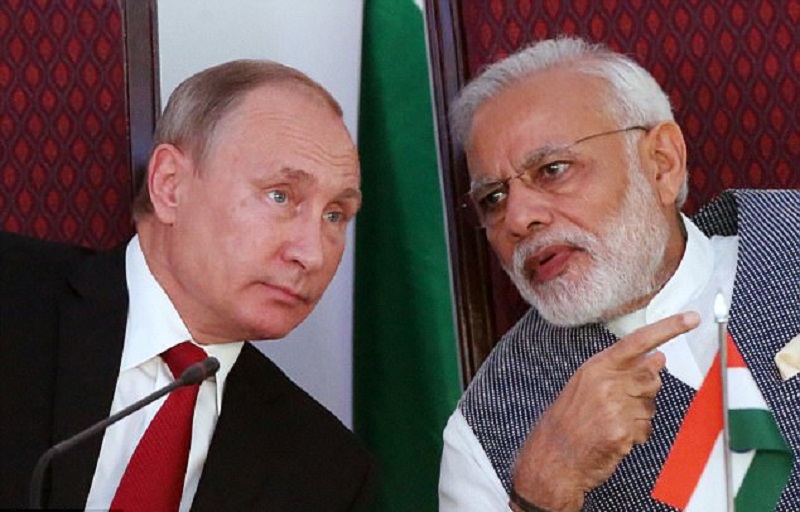The US-led anti-Chinese Quad alliance of itself, Australia, India, and Japan might be on the brink of collapse according to influential BJP ideologue Subramanian Swamy, who warned that Washington might expel New Delhi from this bloc if it goes through with its planned purchase of Russia’s S-400 air defense systems.

One of the most geopolitically consequential blocs of the 21st century is unquestionably the Quad, a US-led anti-Chinese alliance that also includes Australia, India, and Japan.
It presents one of the greatest strategic challenges to the emerging Multipolar World Order because of the potential that it has to offset China’s historic rise and therefore the new model of International Relations that it’s bringing to the forefront of global affairs.
Many analysts have wondered what could possibly be done to stop the Quad, but most of them have since thrown up their hands in despair and seemingly accepted it as a fait accompli that they’re powerless to prevent.
That strategic fatalism might have been a bit too premature, however, after influential BJP ideologue Subramanian Swamy’s public warning on Twitter on Thursday.
Russian publicly financed international media outlet Sputnik reported on his tweet, which read that “I notice none of my facts on Twitter have been proved wrong:
1. China has crossed LAC and occupied our territory.
2. Govt says disengagement has led to PLA withdrawal from Indian side of LAC is false
3. India buying S400 from Russia will lead to US expelling India from QUAD.”
The reader should also be reminded that Swamy published a hateful anti-Russian article last October that elicited a very strong condemnation from the Russian Embassy in India at the time.
India has the right to conduct its foreign affairs however it so chooses in line with what it describes as its “multi-alignment” strategy, but there should be little question in light of his recent statements that Swamy is seemingly pro-American with his outlook and at the very least unfriendly towards Russia.
This influential figure’s statements are at variance with what the Russian and Indian governments officially regard as their special and privileged strategic partnership that’s recently been experiencing a renaissance over the past few years, especially after Prime Minister Modi attended the Eastern Economic Forum in Vladivostok in September 2019 as President Putin’s guest of honor.
Despite some bumps in the road in the year and a half since, ties are back on the positive track following Foreign Secretary Shringla’s visit to Moscow last month.
Quite clearly, Russian-Indian relations remain strong, which provides a much-needed element of certainty in the midst of what can be described as World War C, or the full-spectrum paradigm-changing processes catalyzed by the international community’s uncoordinated attempt to contain COVID-19.
The US’ repeated threats to sanction India for its planned S-400 purchase from Russia run the risk of complicating American-Indian relations, particularly when it comes to their hitherto close military cooperation in attempting to “contain” China through the Quad.
Nevertheless, Prime Minister Modi remains determined to go through with the deal, which speaks of how highly he regards Russia’s role in India’s “multi-alignment” “balancing” act no matter how imperfectly he’s thus far executed it.
Swamy’s warning can therefore be interpreted as pressure upon the premier from within his own government, which shows that some influential forces don’t agree with Prime Minister Modi’s strategic direction.
They’d do well to reconsider their views though since it’s arguably in all of Eurasia’s interests that India concludes the S-400 deal with Russia.
Swamy might actually be right for once, though much to the detriment of the American-aligned grand strategic vision that he seemingly sympathizes with.
The US might not literally expel India from the Quad if it receives Russia’s S-400 air defense systems, but their anti-Chinese military coordination would certainly be adversely affected, especially if America imposes sanctions like it’s repeatedly threatened to do.
That, however, would by default strengthen India’s ties with Russia and China, thus providing a much-needed impetus for reviving their trilateral cooperation through through RIC and thereby strengthening both BRICS and the SCO as well.
This could in turn accelerate the rise of the Eurasian Century, especially as it was recently articulated by Pakistani officials during last week’s inaugural Islamabad Security Dialogue.
In connection with that, it also deserve mention that ties between India and Pakistan are gradually thawing as a result of recent developments between the two, particularly last month’s surprise ceasefire that continues to hold at the time of this analysis’ publication and earlier reports that the UAE is secretly trying to broker a more comprehensive solution to the UNSC-recognized disputed territory of Kashmir.
The resultant reduction of American influence in India in the aftermath of Washington likely going through with its sanctions threats against New Delhi could potentially remove the greatest threat to peace in the region since the US wouldn’t be as powerful as before to divide and rule South Asia by exploiting this unresolved conflict.
In other words, India’s purchase of Russia’s S-400s would be in both of those countries’ interests as well as China’s and Pakistan’s when one considers the larger Eurasian strategic picture.
The Quad probably won’t collapse, nor is it to be expected that the US would expel India from this alliance, but the group’s anti-Chinese military capabilities might take a strong hit as New Delhi would be less prone to closely cooperate with Washington in this respect if it becomes victimized by American sanctions for its sovereign decision to go through with its Russian air defense deal.
With these interconnected dynamics in mind, observers can therefore rightly describe the S-400 deal as potentially being a grand strategic game-changer provided that India retains the political will to go through with it despite Swamy’s and other influential forces’ efforts to stop it.
***
By Andrew Korybko, American political analyst
Published by OneWorld
Republished by The 21st Century
The views expressed in this article are solely those of the author and do not necessarily reflect the opinions of 21cir.
